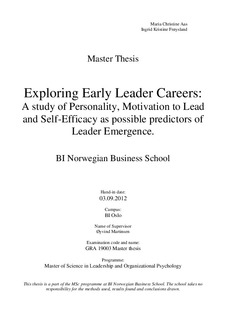Exploring early leader careers : a study of personality, motivation to lead and self-efficacy as possible predictors of leader emergence
Master thesis
Permanent lenke
http://hdl.handle.net/11250/94955Utgivelsesdato
2013-02-08Metadata
Vis full innførselSamlinger
- Master of Science [1621]
Sammendrag
The purpose of this study was to examine and gain further knowledge of how and to what degree young individuals are influenced by the factors Personality, Motivation to Lead and Self-Efficacy when emerging into leadership positions. The empirical research was conducted as the second part of a longitudinal study among previous students from a Norwegian Business School. A total number of 640 respondents participated in the survey, were 623 of them were compatible with the personality profiles that were measured at time one in 2006 and 2007. The results of this study showed that Personality is only partially related to Leader Emergence among young individuals, as only two out of five personality traits was found to be statistically significant, namely Neuroticism and Extraversion. Personality was also found to be somewhat related to MTL (time 2), as not all of the personality traits are statistically significant on all of the MTL components. Further, the MTL component Affective-Identity (time 2) was the only factor that was found to mediate the relationship between Personality and Leader Emergence. Further, the study found that only Conscientiousness had a significant relationship with Self-Efficacy in young leaders. Lastly, it was found to exist significant differences in the mean scores between leaders and non-leaders in the variables Affective-Identity MTL (time 1 and 2) and Self-Efficacy. However, only Affective-Identity MTL (time 2) was found to be a significant predictor of Leader Emergence.
Beskrivelse
Masteroppgave(MSc) in Master of Science in Leadership and Organizational Psychology - Handelshøyskolen BI, 2013
